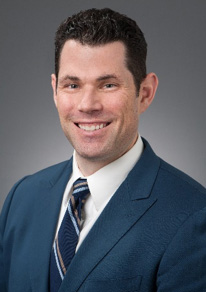By DARTH VAUGHN AND CASEY FLAHERTY
Our legal education system is in shambles. Candidly, there is little the bar can do to ensure that graduates have job opportunities. That’s a market problem that requires a market solution. But the bar can do quite a bit to ensure that law students do not graduate with such a crushing debt burden.
We can, and should, simultaneously make law school less expensive and more affordable. “Less expensive and more affordable” is not redundant. We need to lower the cost of attending law school. But we also need to make it easier for students to afford law school by permitting them a realistic opportunity to earn sustaining income during their studies.

Darth Vaughn.
First, we need to stop mandating analog activities in a digital world. There is no longer any compelling reason to require law students to present themselves in a physical classroom. Maintaining antiquated meatspace is among the biggest cost drivers of legal education. Likewise, commutes and downtime between classes are major obstacles to law students maintaining gainful employment.
Moving to digital classrooms also makes it possible to provide asynchronous learning opportunities. Just as we have progressed from live TV to DVR to streaming, we should also transition to on-demand classrooms. Law students need not view their digital classroom content at some prescribed time during normal business hours. They will get to it when their schedule, including their work schedule, permits.
Second, we must let go of our obsession with assessment. Much of the time demands, and most of the stress, in law school is not about class but about tests. Our law students spend inordinate amounts of time “studying,” especially in the run-up to exams. No human can reasonably be expected to balance cramming with earning a living (cost-reduction bonus: with no tests to grade and students watching prerecorded videos, the need for expensive law professors would be dramatically reduced).
This cramming dynamic is particularly acute when it comes to the bar exam. Students spend several weeks and several thousand dollars to confine themselves in a mini-school that teaches them all that law school did not—i.e., just about everything we make a requirement for entry into the profession. Law schools need to not only be less expensive and more affordable but also do their job of preparing the next generation of lawyers. Getting through law school should be sufficient. The bar exam, like law-school exams, is an undue burden in light of our current economic realities.
Years of psychological testing indicate that skepticism is lawyers’ defining trait. A skeptical bent is an asset for professional issue-spotters. Thus, astute readers saw right through the happy talk above and immediately understood the implications of what was being presented. Anyone who plays some videos on their computer—they don’t even need to pay attention—gets to become a lawyer. The premise is absurd.
Yet isn’t that the basic design of much of our mandatory continuing legal education? While there is a high bar for becoming a practicing lawyer, the semi self-regulated standard for remaining one is that we intermittently play videos on our computer. Depending on the state, you may have to attend some live events. But there is rarely a requirement that you actually have to pay attention during the MCLE. Would the fake law school proposal above really be that much improved by the condition that the prospective lawyers physically sit in a room while someone else talked?
Not every state has a bar exam. Not every state has MCLE. Most states, including Florida, have both. The bargain with the public is that in exchange for a monopoly on certain activities, the profession will ensure that lawyers have and maintain necessary knowledge, skills, and moral character. We address the maintenance commitment by mandating that lawyers meet an hours requirement for profession-related study. But we get what we measure: hours. We do not require they actually learn anything. Many lawyers consider this butt-in-the-seat obligation to be a charade that wastes time.

Casey Flaherty.
This state of affairs is suboptimal. And it is growing more untenable as the pace of change accelerates. According to tech-pioneer-turned-educational-researcher John Seely Brown, the half-life of a learned skill used to be 30 years. If you graduated law school in 1955, the world of 1985 would have mostly passed you by if you had failed to update your skill set. Today, the half-life of a learned skill is only five years and shrinking. Even if law school fully prepared lawyers for the demands of their professional environment, which they don’t, we would still need to be a profession of continual lifetime learners in order to keep up with the rapid pace of technological change. Current MCLE requirements ensure lawyers set aside time from their busy schedules to “learn” but fail to ensure the time is being put to good use. But some states, like Florida, are moving in the right direction towards optional competence-based CLE.
In subsequent posts, we are going to state the strong case for the need for competence-based education, and profile some the groundbreaking efforts by The Florida Bar in connection with its new mandatory technology CLE requirements.
Darth Vaughn is a partner and director of legal process services at Haight Brown & Bonesteel. Casey Flaherty is of counsel and director of client value at Haight Brown & Bonesteel. Darth and Casey are both principals in the legal operations consultancy Procertas and authors of the Legal Technology Assessment.